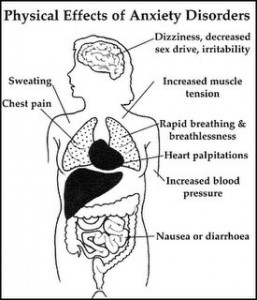Generalized anxiety disorders, phobias, panic attacks, obsessive compulsive disorders, posttraumatic stress disorders (PTSD) makeup this category of impairments. 
Persons with generalized anxiety disorders are unable to handle jobs involving stress or dealing with the public. The type of stress that could trigger an anxiety attack varies from job to job.
A phobia can prevent a person from performing a certain duty required of the job if the duty is associated with an object, activity or situation the person fears.
Panic attacks, if frequent enough, can interfere with work activity . The Social Security Administration will focus on how many panic attacks occur within the course of one day or the course of one week. Sometimes the person that suffers from panic attacks is afraid to leave their house without a security figure close to them. When a person is afraid to leave their home this is called Agoraphobia. The Social Security Administration analyzes Agoraphobia by looking at whether the person can leave the home at all and can the person function independently outside of the home area. 
People with obsessive-compulsive disorders are obsessed with ideas that may no to be strange or ridiculous, but they cannot get these ideas out of their minds. These people feel compelled to take actions that they know are ridiculous, but they cannot help themselves.
Posttraumatic stress disorders are seen in veterans exposed to combat, survivors of tragedies (i.e., auto accidents, airplane crashes, child abuse, and violent physical attacks). The Social Security Administration will focus on the frequency of the recurrent and intrusive recollections of the traumatic experience.  The underlying theme for analyzing PTSD cases is whether or not the person can function properly at a job without having recurrent overwhelming thoughts of the dramatic experience interfering with their memory and concentration.
The underlying theme for analyzing PTSD cases is whether or not the person can function properly at a job without having recurrent overwhelming thoughts of the dramatic experience interfering with their memory and concentration.
The most important thing to remember when presenting a case to the Social Security Administration is that the focus will be on long-term treatment notes by the doctor. The Social Security Administrations’ reasoning is that if you truly have a problem with anxiety, then the treatment notes will reflect this. In addition to treatment notes, medications are important to show to the Social Security Administration that you are doing all you can to control the anxiety. One area of proof that cannot be overlooked is the mere fact of attempting to work can actually show the inability to work. TA history of many jobs in a very short period of time, each ending with the person getting fired or quitting can be extremely effective in showing disability.

 Gregory Kornegay,
Gregory Kornegay,
